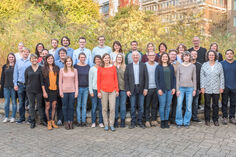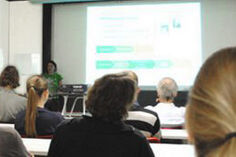Heidelberg International Graduate School for P4-Medicine (Hei-P4-Medicine)

P4-Medicine refers to Predictive, Preventive, Personalised and Participatory medicine and strongly depends on the identification, validation and clinical assessment of reliable biomarkers for (1) individualized risk prediction and early detection, (2) accurate primary, secondary and tertiary prevention, and (3) personalised diagnosis and treatment. The Heidelberg International Graduate School for P4-Medicine (Hei-P4-Medicine) is embedded in ongoing research projects at the Statistical Genetics Research Group to improve P4-Medicine for gallbladder cancer (GBC) – a very aggressive and neglected disease occurring mainly in low- and middle-income regions and countries.
As a result of established international research collaborations, Hei-P4-Medicine PhD students have access to unique sample collections and datasets: The collaborative efforts of our Latin American research partners and the large European prospective cohorts have resulted in comprehensive epidemiological and clinical data as well as saliva, whole blood, serum, plasma, gallbladder tissue, urine and faeces samples from more than 7000 gallstone disease and gallbladder cancer patients that have undergone genome-wide genotyping, epigenome-wide methylation, whole exome and non-coding (nc)RNA sequencing, metabolomics, proteomics and microbiome profiling. In our Graduate School, we are training PhD students in P4-Medicine through an innovative combination of “hands-on” training (e.g. active participation in patient recruitment, application of novel molecular, epidemiological and biostatistical methods such as ncRNA sequencing, Mendelian randomisation, deep and machine learning), complemented by training in “soft” skills (e.g. effective dissemination of research results).
The research activities of the PhD students within the Hei-P4-Medicine Graduate School ultimately aim to (a) identify geographical, environmental, lifestyle, ethnic and molecular differences in GBC risk, and (b) translate the identified differences into applied GBC P4-Medicine, in particular the development of optimised GBC prevention programmes adapted to the specific characteristics of different national health systems, as a P4-Medicine model for a neglected disease affecting mainly low- and middle-income regions.
Heidelberg International Summer School for Doctoral Students
ANCESTRY MEETS MOLECULAR HEALTH
OPPORTUNITIES OF GENETIC DIVERSITY FOR PREDICTIVE, PREVENTIVE, PERSONALISED AND PARTICIPATORY (P4) MEDICINE
20–24 November 2023
Heidelberg Center Latin America, Santiago de Chile
AIMS
This summer school aims to bring together scientists working at the interface of statistical genetics and molecular medicine to discuss the opportunities and challenges arising from genetic ancestry and inbreeding for P4-Medicine.
The summer school will be held at the Heidelberg Center Latin America from 20–24 November, with a preparatory online meeting on 16 October 2023.
Advanced Courses
- Introduction to Mendelian Randomization (organized within the EU-funded research project EULAT Eradicate GBC)
- Biostatistical Analysis of Genotype Data (organized within the EU-funded research project EULAT Eradicate GBC)
- Statistical Genetics and Genetic Epidemiology, Bioinformatics, and Study Designs in Biometry and Epidemiology (MSc in Medical Informatics, University of Heidelberg)
- Biostatistics, Genetic Epidemiology and Advanced Statistical Methods (MSc in Medical Informatics organized by University of Heidelberg and University of Chile)
- Introduction to Bioinformatics, Introduction to Bayesian Statistics and Genetic Epidemiology (MSc in Medical Biometry/Biostatistics, University of Heidelberg)
- Epidemiology, Major in Cancer Biology organized by the Faculty of Biosciences, University of Heidelberg in collaboration with the German Cancer Research Center
- Descriptive Exploratory and Confirmatory Statistical Analysis (Training in Clinical Research organized by the Bolivian National Health Fund)
- Genetic Epidemiology and Introduction to Bayesian Statistics (MSc in Epidemiology, Medical Biometry/Biostatistics, University of Mainz)
Journal Club
The Statistical Genetics Journal Club aims at discussing relevant articles, software and databases in the field of statistical for molecular medicine.
The Journal Club meets on a regular basis every two weeks. If you wish to be notified of upcoming Journal Clubs, please email us at the following address: lorenzo@imbi.uni-heidelberg.de. If you are interested in details about former Journal Clubs, please contact directly the speaker.
Recent Topics:
- Identification and validation of circulating µRNAs associated with gallbladder cancer risk in Europeans
A. Blandino
- Risk of Cancer after Cholecystectomy in Sweden
E. Kharazmi
- Genetic-genomic characterization of Chilean patients with gallbladder cancer
V. Gárate
- Genetically determined gene expression levels and survival of colorectal cancer patients
H. Deutelmoser
- UK Biobank data and data retrieval
J. Lorenzo Bermejo, F. Boekstegers
- Power calculations in Mendelian Randomization Studies
J. Lorenzo Bermejo, C. Barahona Ponce, L. Zollner
- Aspirin, gallbladder cancer and colorectal adenomas – Mendelian Randomization Studies D. Scherer
- Introduction to the article:
McGregor et al. "An evaluation of methods correcting for cell-type heterogeneity in DNA methylation studies"
http://www.ncbi.nlm.nih.gov/pmc/articles/PMC4855979/
J. Brägelmann
- Databases for in-silico functional assessment: ENCODE, Ensembl, 1000GP, HaploReg et al.
D. Scherer
- Introduction to the article:
Noel et al. "Does the frequency of cholecystectomy affect the ensuing incidence of gallbladder cancer in Sweden? A Population-Based study with a 16-Year Coverage"
http://www.ncbi.nlm.nih.gov/pubmed/26470697
F. Boekstegers
- Introduction to the article:
The 1000 Genomes Project Consortium "A global reference for human genetic variation"
http://www.nature.com/nature/journal/v526/n7571/full/nature15393.html
C. Fischer
- Introduction to the article:
Mavaddat et al. "Prediction of Breast Cancer Risk Based on Profiling with Common Genetics Variants"
http://www.ncbi.nlm.nih.gov/pubmed/25855707
K. García Mesa
- Introduction to the article:
Parker et al. "Admixture Mapping Identifies a Quantitative Trait Locus Associated with FEV1/FVC in the COPD Gene Study"
http://www.ncbi.nlm.nih.gov/pubmed/25112515
R. Brinster
- Introduction to the article:
Bauchet et al. "Measuring European Population Stratification with Microarray Genotype Data"
http://www.ncbi.nlm.nih.gov/pubmed/17436249
F. Boekstegers
- Introduction to the MENDEL package for Statistical Analysis
https://www.genetics.ucla.edu/software/download?file=202
J. Lorenzo Bermejo
- Introduction to linkage analysis
C. Fischer
- Introduction to the article:
Holsinger et al. "Genetics in geographically structured populations: defining, estimating and interpreting FST"
http://www.nature.com/nrg/journal/v10/n9/full/nrg2611.html
J. Lorenzo Bermejo
- Introduction to the article:
Baran et al. "Fast and accurate inference of local ancestry in Latino populations"
http://bioinformatics.oxfordjournals.org/content/28/10/1359.full.pdf+html
J. Lorenzo Bermejo
- External data repositories (1/3) on genotype/phenotype data
database of Genotypes and Phenotypes dbGaP ( http://www.ncbi.nlm.nih.gov/gap) and the European Genome-phenome Archive EGA (http://www.ebi.ac.uk/ega/).
B. Peil
External data repositories (2/3) on epigenetic data - GEO (http://www.ncbi.nlm.nih.gov/geo/),
TCGA (http://cancergenome.nih.gov/) and
GTEx (http://www.broadinstitute.org/gtex/).
M. Kabisch
- External data repositories (3/3) on epigenetic data
Pathway databases GO (http://geneontology.org/) and
KEGG (http://www.genome.jp/kegg/),
Encode (https://genome.ucsc.edu/encode/)
C. Legrand
- Introduction to the article:
Ghani et al. "Evidence of Recessive Alzheimer Disease Loci in a Caribbean Hispanic Data Set Genome-wide Survey of Runs of Homozygosity"
http://www.ncbi.nlm.nih.gov/pubmed/23978990
C. Fischer
- Introduction to the article:
Bryc et al. "The Genetic Ancestry of African Americans, Latinos, and European Americans across the United States"
http://www.ncbi.nlm.nih.gov/pubmed/25529636
J. Lorenzo Bermejo
- Introduction to the R package DESeq2
http://www.bioconductor.org/packages/release/bioc/html/DESeq2.html
R. González Silos
- Introduction to the article:
Eyheramendy et al. "Genetic structure characterization of Chileans reflects historical immigration patterns"
http://www.nature.com/ncomms/2015/150317/ncomms7472/full/ncomms7472.html
F. Boekstegers


